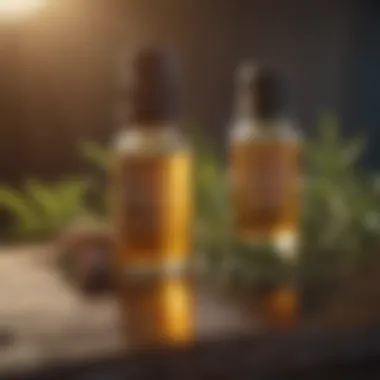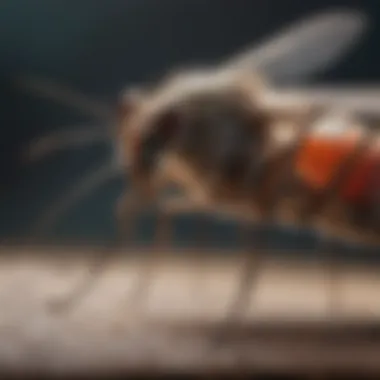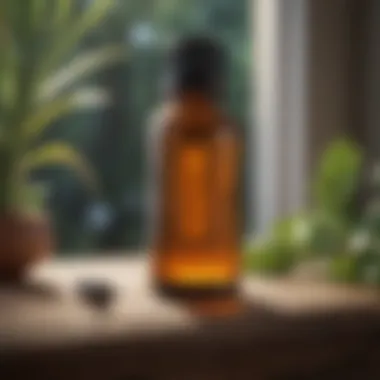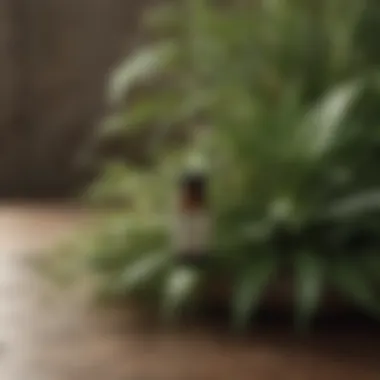Natural Essential Oils for Effective Mosquito Control


Intro
In recent years, the use of essential oils as alternatives for mosquito repellents has gained attention. Many housewives and homeowners are seeking methods to manage these pests without relying on harsh chemicals. With the right knowledge, essential oils can offer effective solutions. This article delves into the world of essential oils, presenting how they work against mosquitoes and their applications.
Understanding the Pest
Identification
Mosquitoes, particularly species like Aedes aegypti and Anopheles gambiae, are small flying insects that thrive in warm, humid environments. Recognizing these pests is vital for effective repellence. They are typically characterized by their slender bodies, long legs, and the distinctive buzzing sound they produce. Their presence is often an indicator of nearby water sources, as these areas are conducive for breeding.
Life Cycle
The life cycle of mosquitoes consists of four primary stages: egg, larva, pupa, and adult. A female mosquito lays eggs in stagnant water. After hatching, larvae emerge and undergo several molts before transitioning to the pupal stage. Within a few days, adult mosquitoes emerge, ready to seek blood meals and continue the cycle. Understanding this life cycle can help homeowners take preventive measures at specific phases to reduce mosquito populations.
Pest Prevention Strategies
Environment Modification
A fundamental method in mosquito management is environmental modification. This involves eliminating standing water and reducing potential breeding sites. Homeowners can:
- Regularly empty containers that hold water.
- Maintain pools with proper filtration and chlorination.
- Clean gutters to prevent water accumulation.
Adopting these techniques can significantly lower mosquito populations and disrupt their life cycle.
Physical Barriers
Physical barriers can be highly effective in providing protection from mosquitoes. Solutions include:
- Installing screens on windows and doors.
- Utilizing mosquito nets over beds.
- Wearing long-sleeved clothing and using hats when outdoors.
These barriers can minimize exposure, particularly during peak mosquito activity hours, such as at dawn and dusk.
Control Methods
Chemical Control
Though the goal here is to explore natural alternatives, it’s worthwhile to mention that chemical controls also exist. Traditional repellents, often containing DEET or picaridin, can provide quick relief but pose health concerns. Essential oils present a safer choice for many.
Biological Control
Another sustainable strategy is biological control, which involves using natural predators to manage mosquito populations. For instance, introducing fish species that feed on mosquito larvae in water bodies can help control their numbers.
"Utilizing multiple strategies in an integrated pest management approach optimizes effectiveness and sustainability."
Culmination
The combined understanding of mosquito behavior, life cycle, prevention strategies, and control methods sets the foundation for utilizing essential oils effectively. Knowledge in this area empowers homeowners to manage pests safely and sustainably.
Preamble to Mosquito Control
Controlling mosquito populations is vital for both public health and comfort in residential areas. Mosquitoes are not just a nuisance; they act as vectors for various diseases such as malaria, dengue, and West Nile Virus. These illnesses can have severe repercussions, particularly for vulnerable populations, including children and the elderly.
The Importance of Controlling Mosquito Populations
Understanding the significance of mosquito control is crucial. High mosquito populations can lead to outbreaks of the aforementioned diseases. The health risks associated with mosquitoes extend beyond personal discomfort. Large-scale infestations can burden healthcare systems and negatively impact economic activities, especially in tourism and outdoor engagements. By mitigating mosquito populations, communities can foster healthier living environments and enhance quality of life.
Moreover, controlling mosquitoes can help preserve biodiversity. In swamps, lakes, and similar ecosystems, mosquitoes are part of the food web. However, when their populations learn to thrive, they can disrupt other species. Hence, effective mosquito control can promote balanced ecosystems.
Overview of Traditional Mosquito Control Methods


Traditional mosquito control methods have evolved over the years, typically focusing on chemical solutions. Pesticides like permethrin and malathion have been widely used to reduce mosquito populations, particularly in public spaces. These chemicals can be sprayed in areas where mosquitoes congregate, aiming to kill adult mosquitoes before they reproduce.
Despite their effectiveness, traditional chemical methods are not without concerns. There are worries about the environmental impact of these chemicals. They can contaminate soil and water sources, affecting not only mosquitoes but also other beneficial insects, plants, and even animals. Additionally, there is a growing concern over the development of resistance among mosquito populations, leading to a cycle where more potent chemicals must be used over time.
Although larvicides offer another approach, targeting juvenile mosquitoes before they mature, the environmental risks persist. As a result, there is a pressing need to explore integrated pest management strategies, which focus on a combination of methods that include environmentally friendly alternatives. Essential oils emerge as possible solutions in this context, offering a natural and sustainable way to repel mosquitoes without the adverse side effects associated with traditional methods.
Understanding Mosquito Behavior and Attraction
Understanding mosquito behavior is critical for effective repellence strategies. Mosquitoes are not just random insects; they exhibit specific behaviors that guide their attraction to hosts. Knowledge of these behaviors can significantly enhance the application of essential oils as natural repellents. When knowing how mosquitoes perceive their environment, individuals can make informed choices about which essential oils to use and how to employ them in their daily lives.
Factors Influencing Mosquito Attraction
Several factors play a role in attracting mosquitoes. These include:
- Carbon Dioxide Emission: Mosquitoes are drawn to carbon dioxide produced by humans and animals during respiration. Higher concentrations in the air signal potential hosts.
- Body Heat: Body temperature is another significant factor. Warmth emanating from a person can entice mosquitoes to approach.
- Skin Chemicals: Natural skin chemicals such as lactic acid, uric acid, and ammonia are attractive to these pests. Different individuals produce varied levels of these compounds, affecting how attractive they are to mosquitoes.
- Color and Movement: Mosquitoes may also be attracted to certain colors, particularly dark shades. Additionally, movement can capture their attention, making still individuals less likely to be approached.
By exploring these influences, individuals can adapt their environments to minimize mosquito attraction.
The Role of Scent in Mosquito Attraction
Scent plays a pivotal role in mosquito attraction. Olfactory cues help mosquitoes locate their targets from significant distances. They utilize specialized receptors to detect various scent molecules. Specific smells can either attract or repel these insects.
Important points regarding scent include:
- Floral and Fruity Scents: Certain fragrances, often associated with flowers and ripe fruits, can be alluring to mosquitoes. They may mistake these scents for signals of available hosts.
- Body Odors: The natural scent of human skin, influenced by genetics, diet, and hygiene, can be potent in attracting mosquitoes.
- Essential Oils: Some essential oils emit odors that mask attractive scents and deter mosquitoes. For example, citronella and peppermint oil can confuse or repel them effectively.
Incorporating the knowledge of scent into mosquito control is essential for optimizing the use of essential oils. By understanding these dynamics, homeowners can take proactive measures to safeguard their spaces from mosquito invasions.
Essential Oils: A Natural Repellent
Essential oils have gained attention as a potential solution for mosquito repellence in recent years. They offer an alternative to synthetic chemical repellents. These natural oils provide not only an effective deterrent against mosquitoes but also an added layer of comfort for households concerned about chemical exposure. The significance of using essential oils lies in their ability to repel mosquitoes while being less harmful to the environment. Additionally, they often come with pleasant aromas, making their use more appealing in residential settings.
Definition and Composition of Essential Oils
Essential oils are concentrated plant extracts that retain the natural scent and flavor of their source. They are typically composed of a variety of compounds, including terpenes, alcohols, esters, and aldehydes. The specific composition of an essential oil can vary based on species, growing conditions, and extraction techniques. Common essential oils used for mosquito repellence include citronella, eucalyptus, lavender, tea tree, and peppermint.
"The unique chemical structure of essential oils allows them to interfere with the sensory perception of mosquitoes, making them less likely to approach humans."
Understanding the composition of each oil is crucial in recognizing its effectiveness. For example, citronella oil is high in citronellal and geraniol, which have repellent properties. The science behind these components explains why essential oils can be effective in deterring mosquitoes.
Extracting Essential Oils: Methods and Sources
The extraction of essential oils can be achieved through several methods. The most common techniques include steam distillation, cold pressing, and solvent extraction. Each method has its own set of advantages and disadvantages:
- Steam Distillation: This is the most prevalent method. Steam is passed through plant material, causing the oil to evaporate. The vapor is collected and cooled, where the essential oil is separated from water.
- Cold Pressing: Often used for citrus oils, this method involves mechanically pressing the fruit peels to extract the oil. This process preserves the oil's natural fragrance and properties.
- Solvent Extraction: This method uses chemical solvents to extract oil from the plant material. The resulting product can contain trace amounts of the solvent, which may be a concern for some users.
The choice of extraction method influences the quantity and quality of the essential oil. Sources for essential oils include a wide range of plants, each offering unique properties. Knowledge of both the methods of extraction and the source plants is vital for making informed decisions regarding their use in mosquito repellence. Understanding ethical sourcing and environmental considerations is also important when selecting essential oils for personal use.
Effective Essential Oils for Repelling Mosquitoes
Understanding the effectiveness of essential oils in repelling mosquitoes is crucial for anyone dealing with these pests. This section will delve into specific oils that are notable for their repellent properties. These essential oils not only provide a more natural alternative to synthetic repellents but they also offer additional benefits. Homeowners can integrate these oils into their routine to enhance protection against mosquitoes in a safe and sustainable manner.
Citronella Oil: Origin and Efficacy
Citronella oil, derived from the leaves of the Cymbopogon genus, has gained a reputation as a powerful insect repellent. It has been widely used for over a century, often marketed in candles and sprays. Citronella does not merely mask scents; it consists of compounds that disrupt the olfactory receptors in mosquitoes, thereby making it difficult for them to locate their targets. Research supports its efficacy, showing that citronella oil can reduce mosquito activity for several hours. However, the effectiveness may vary depending on the application method and environmental conditions.
Lemon Eucalyptus Oil: Scientific Evidence
Lemon eucalyptus oil is another essential oil with significant mosquito-repellent properties. Studies indicate that its primary compound, citronellal, exhibits strong insecticidal activity. In fact, in some cases, lemon eucalyptus oil has proved to be as effective as DEET, which is a common ingredient in synthetic repellents. The effectiveness of this oil lies in its ability to mask human scent, reaching further and staying potent for longer periods. Furthermore, its pleasant fragrance makes it appealing for personal use.
Lavender Oil: Dual Benefits for Homeowners


Lavender oil is well-known for its calming and soothing qualities, but it also serves as a mosquito repellent. The aroma of lavender is not only pleasant for humans but is unappealing to mosquitoes. Over the years, many homeowners have turned to lavender oil to both deter pests and enhance the atmosphere of their living spaces. Moreover, lavender has skin-soothing properties, which can be advantageous in cases of mosquito bites. Its dual benefit makes it a favored choice among those seeking a more holistic approach to pest management.
Tea Tree Oil: Properties and Application
Tea tree oil, distilled from the leaves of the Melaleuca alternifolia, is renowned for its antibacterial and anti-inflammatory properties. When it comes to mosquitoes, tea tree oil acts as both a repellent and an irritant. The unique chemical compounds in this oil can interfere with mosquito hormonal systems. When used in conjunction with carrier oils for topical application, tea tree oil can provide effective repellent properties while also treating any skin irritations from bites. Its versatility adds to its appeal as a natural pest deterrent.
Peppermint Oil: Repellant Characteristics
Peppermint oil is often overlooked in the discussion of mosquito repellents. However, its pungent aroma can effectively deter mosquitoes. Various studies have shown that peppermint oil can repel mosquitoes up to a certain distance. The menthol component in this oil not only disrupts the mosquitoes’ sense of smell but may also provide a cooling effect on the skin. Integrating peppermint oil into homemade repellents offers an easy and pleasant way to keep mosquitoes at bay. It can be diluted with a carrier oil or mixed with other essential oils for improved effectiveness.
"Natural essential oils present a sustainable alternative to traditional mosquito repellents while offering multiple benefits."
Utilizing essential oils for mosquito control is not merely a trend—it's a viable solution for homeowners. Each type of oil has unique characteristics that can enhance domestic pest management strategies. Ultimately, the selection of the right essential oils will depend on individual preferences, application methods, and the specific mosquito issues faced.
Mechanisms of Action: How Essential Oils Work Against Mosquitoes
Understanding the mechanisms of action behind essential oils in repelling mosquitoes is crucial for effective pest management. Essential oils contain various compounds that interact with the sensory systems of mosquitoes. By studying these interactions, homeowners can optimize their use of natural repellents in combination with other control methods. The biological basis for these actions underscores why specific essential oils are more effective than others, providing insight into practical applications.
Olfactory Responses in Mosquitoes
Mosquitoes primarily rely on their sense of smell to detect hosts. They are drawn to the carbon dioxide and other odors that humans and animals emit. Essential oils can disrupt this olfactory process by masking these attractive scents. For instance, citronella oil, known for its strong citrus scent, can confuse mosquitoes, making it harder for them to locate their targets.
Studies indicate that certain compounds within essential oils bind to the olfactory receptors of mosquitoes, creating a strong repellent effect. This means using essential oils effectively can contribute to reduced mosquito attraction. Targeted use can significantly mitigate the chances of bites, providing a natural solution for people looking to avoid synthetic chemicals.
Impact on Mosquito Behavior and Physiology
Beyond just olfactory responses, essential oils significantly affect mosquito behavior and physiology. Some oils can induce physiological stress responses in mosquitoes. For example, when exposed to tea tree oil, mosquitoes show signs of decreased locomotor activity. This reduced movement results in less interaction with humans, thus lowering the chances of bites being inflicted.
Essential oils may also affect the reproductive capabilities and lifespan of mosquitoes. Continuous exposure to these oils can lead to lower survival rates in mosquito populations. This evidence highlights the potential of incorporating these oils into broader integrated pest management practices.
Integrating knowledge of these mechanisms into everyday use allows homeowners to make informed decisions regarding natural pest control, offering a dual benefit: personal protection from bites and a potential reduction in mosquito populations over time.
"By understanding how essential oils affect mosquito behavior, families can create a more sustainable living environment while keeping these pests at bay."
Application Techniques for Essential Oils
Understanding how to properly apply essential oils is crucial for their effectiveness as mosquito repellents. The right techniques not only enhance their efficacy but also ensure safety for the user and the environment. This section will delve into the essential practices involved in the application of these oils, focusing on dilution, mixing guidelines, and methods of application.
Dilution and Mixing Guidelines
Essential oils are highly concentrated products. Thus, using them without dilution can result in skin irritations or other negative reactions. When preparing a solution, knowing the right ratio is essential for safety and functionality.
- Dilution Recommendations: A common guideline is to mix 15-30 drops of essential oil with 2 tablespoons of a carrier oil like coconut or almond oil. This mixture is generally safe for skin application.
- Testing for Sensitivity: It is wise to perform a patch test before applying any diluted essential oil on large skin areas. Apply a small diluted amount to your wrist and wait 24 hours to check for adverse reactions.
- Mixing Procedures: Mixing essential oils with water may be less effective as oils do not dissolve. Instead, utilizing a dispersing agent like vodka can help to evenly distribute the oil in water when used in a spray bottle.
Advance preparation will make the application smoother and more effective for repelling mosquitoes.
Methods of Application: Topical and Environmental
The technique used for applying essential oils can greatly influence their effectiveness in mosquito repelling. There are two main methods: topical application and environmental diffusion.
Topical Application
Applying essential oils directly on the skin is popular, especially during outdoor activities.
- Application on the Skin: After dilution, use hands to apply oil on exposed areas like arms and legs, avoiding sensitive regions.
- Reapplication Frequency: Depending on the environment, reapplication every few hours may be necessary, particularly in heavily infested areas.
Environmental Application
When creating a mosquito-free zone, environmental applications are advantageous.
- Diffusers: Using an essential oil diffuser disperses the oil into the air. This method is suitable for indoor use.
- Spray Solutions: Combine diluted essential oils in a spray bottle for outdoor areas. Spray around door frames, patios, and yards for wider coverage.


"Employing both topical and environmental applications increases the chances of keeping mosquitoes at bay."
Choosing the appropriate application method based on the situation enhances the efficiency of essential oils as insect repellents. This brings an added layer of control in managing mosquito populations.
Safety and Precautions When Using Essential Oils
Using essential oils can be a natural and effective approach for repelling mosquitoes. However, it is crucial to consider safety and precautions related to their use. Essential oils are potent extracts from plants and can cause adverse reactions if not used carefully. It is important that users are aware of potential allergies, sensitivities, and proper handling to maximize benefits and minimize risks.
Understanding Potential Allergies and Sensitivities
Some individuals may be allergic or sensitive to particular essential oils. It is advisable to do a patch test before applying any oil on the skin. This involves placing a small amount of diluted oil on a small area and observing for any adverse reactions. Symptoms of an allergic reaction may include redness, itching, or swelling. Common irritants include peppermint oil, tea tree oil, and citronella oil.
Here are some tips to consider:
- Dilution Matters: Always dilute essential oils with a carrier oil, such as coconut or almond oil. This reduces the risk of skin irritation.
- Consultation: Pregnant women and people with skin conditions should consult a healthcare professional before using essential oils.
- Children and Pets: Be cautious when using oils around children or pets, as some essential oils can be harmful to them.
"Understanding your body's reaction to essential oils is as important as knowing the benefits they offer."
Proper Storage and Handling of Essential Oils
Proper storage and handling of essential oils extend their shelf life and effectiveness. Essential oils can degrade if exposed to light, heat, or air. Here are some guidelines to ensure they remain safe and potent:
- Dark Glass Containers: Store oils in dark glass bottles to protect them from light.
- Cool, Dry Place: Keep essential oils in a cool and dry environment, away from direct sunlight.
- Tightly Sealed: Always seal bottles tightly to limit exposure to air.
- Avoid Contamination: Do not apply oils directly from the bottle. Instead, use a dropper to avoid contamination.
By following these safety precautions and storage practices, users can enjoy the benefits of essential oils while minimizing potential risks associated with their use.
Integrating Essential Oils into Pest Management Practices
Integrating essential oils into pest management practices is an emerging strategy for homeowners looking for effective, eco-friendly solutions to repel mosquitoes. This approach recognizes the limits of traditional mosquito control methods while highlighting the significant benefits that essential oils can provide. By combining natural remedies with conventional methods, one can form a holistic pest management plan that is both sustainable and efficient.
One key benefit of using essential oils is their ability to offer a less toxic alternative to synthetic pesticides. Many homeowners are becoming increasingly concerned about the potential health risks posed by chemical repellents. Essential oils like citronella, tea tree, and lavender not only repel mosquitoes but also are less harmful to humans, pets, and other beneficial insects.
Incorporating essential oils into existing pest control programs requires careful consideration. It's important to select oils proven to be effective and compatible with traditional methods. Additionally, knowledge on optimal concentrations and application methods is crucial for maximizing efficacy while minimizing any adverse effects.
Combining Essential Oils with Traditional Control Methods
Combining essential oils with traditional mosquito control methods can enhance overall effectiveness. For instance, while traps and chemical sprays serve specific purposes, essential oils can augment these methods through barrier protection and natural deterrence. Utilizing citronella oil in candle form can protect sitting areas outdoors while chemical sprays can target mosquitoes in resting areas.
When developing a strategy, consider the following:
- Regional Species Knowledge: Different mosquito species may react differently to essential oils. Understanding local species can help tailor your approach.
- Timing and Frequency: Oils may require more frequent reapplication compared to traditional methods, so planning this into your pest management routine is key.
- Sustainable Practices: Regularly using essential oils can contribute to maintaining biodiversity in your gardens, supporting pollinators and other beneficial species.
Evaluating Effectiveness: Field Trials and Research
Evaluating the effectiveness of essential oils in mosquito control through field trials is crucial. Scientific research provides insights into which oils work best under specific conditions. Peer-reviewed studies often compare the efficacy of essential oils with that of synthetic chemicals to determine their impact on mosquito populations. For example, research has demonstrated that lemon eucalyptus oil can offer protection as effective as DEET when used properly.
Field trials typically focus on factors such as:
- Duration of Effectiveness: Understanding how long essential oils can effectively repel mosquitoes helps plan applications.
- Environmental Factors: Temperature, humidity, and vegetation can impact an oil's effectiveness. This necessitates testing in varied environments.
"Research into essential oils is not just about finding one solution. It is about ongoing study to improve pest management strategies continuously."
Ending: The Future of Essential Oils in Mosquito Control
The discourse around mosquito control techniques has notably broadened. The rise of essential oils as viable alternatives to synthetic repellents offers promising avenues for both effectiveness and sustainability. Essential oils, derived from plants, possess inherent properties that not only repel mosquitoes but also pose minimal risk to the environment compared to conventional insecticides. With increasing awareness of ecological impacts, many homeowners are drawn to alternatives that align with their values.
Research Trends in Essential Oils and Insect Repellents
Current research reflects a significant interest in the efficacy of essential oils against mosquitoes. Studies have increasingly focused on the molecular mechanisms that underpin the repellency offered by oils such as citronella, eucalyptus, and lavender. Emerging data indicates that specific compounds within these oils disrupt the olfactory receptors of mosquitoes. Therefore, ongoing studies aim to isolate and synthesize these compounds for enhanced effectiveness in repelling insects. The objective is not merely to validate traditional knowledge but to refine formulations that could increase the longevity and potency of these natural repellents. This direction of research holds promise for developing more efficient products to protect against mosquito-borne diseases while being conscious of overall health and environmental safety.
Final Thoughts on Sustainable Mosquito Management
The integration of essential oils into pest management is not only practical but also crucial for sustainable practices. Homeowners seeking to manage mosquito populations face choices that reflect their preferences for health and nature. Utilizing essential oils can be part of a broader integrated pest management strategy. Aligning natural repellents with other methods is key to creating an effective defense without compromising ecological balance.
As interest in sustainability rises, essential oils may become a more prominent player in pest management. They present an opportunity to reduce dependence on synthetic chemicals while boosting public awareness of natural solutions. Engaging with the future of mosquito control involves understanding both the benefits and limitations of essential oils. While they may not be a panacea, their potential for contributing to a holistic approach to mosquito management is significant.
In a world increasingly aware of environmental concerns, incorporating essential oils for mosquito control is not just a fad; it may represent a shift towards smarter and more sustainable choices in pest management.







